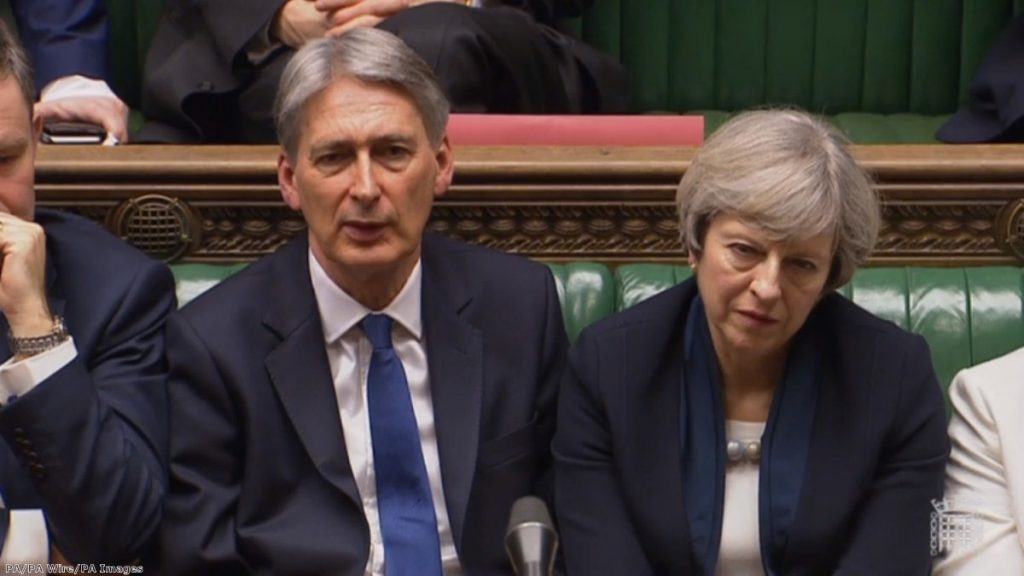By Chaminda Jayanetti
Yesterday marked six months to the day since Theresa May's infamous "nothing has changed" press conference that helped sink her bid for an increased majority at the June election.
At the time, she was desperately trying to mop up the mess of the disastrous 'dementia tax', which was slung into the Tory manifesto at the last moment. Her frantic insistence that black was white and up was down wrecked her reputation for calmness and stability.
In an election where many pundits had been sharpening their pencils to write off Labour's manifesto as a 'suicide note', it was the blue side – the team that were assumed to be good at 'politics' – who committed hara-kiri instead.


The Tory manifesto, largely the product of May and her chief advisors Nick Timothy and Fiona Hill, was a miserable shambles.
The trouble was, George Osborne's 2015 manifesto had also proved utterly undeliverable. It was an exercise in calculated charlatanry, with unspecified welfare cuts to support an unachievable spending target while promising the earth to the middle classes.
The Conservative leadership had no intention of carrying it out. Instead they were aiming for another Lib Dem coalition that would allow them to dump most of it – EU referendum included.
But the snake oil worked too well. The Tories won a majority, tried to slash tax credits, held their referendum, and the rest is history.
Scarred by that experience, this spring the Tories erred the other way – they tried to under-promise, on the assumption that Jeremy Corbyn's prior unpopularity would win them the election by itself. It didn't.
Yesterday's Budget has done what the Tory manifesto should have. It has made promises. It has a headline-grabbing stamp duty cut to win round middle-class millennials. It promises money for the regions outside London to improve their public transport systems. There is the obligatory random figure for the NHS.
Had the prime minister – who openly marginalised Philip Hammond in her election campaign – had this as her manifesto, history would have turned out differently.
For a while, that is.
Because the difference between manifestos and Budgets is that manifestos don't have to actually deliver, but Budgets do. On first sight that seems back-to-front – manifestos are the headline election pledges that governments are subsequently held to, while Budgets are full of small print no-one reads and announcements everyone forgets.

But break an election pledge and a government can still survive, just so long as the economy putters along and people feel better off. And how can it achieve that? Through the measures announced at subsequent Budgets. Manifestos elect governments – Budgets maintain them.
And this is where Hammond has a problem. No matter what the post-Budget polling says about the stamp duty cut, unless the under-40s can actually find somewhere affordable and secure to live by the next election, it’ll count for nothing.
The Office for Budget Responsibility reckons the stamp duty cut will push up house prices. Raising a deposit remains impossible for many. Private renting is a nightmare. Council housebuilding is DOA. So while the stamp duty cut hogs the headlines, Hammond is wholly reliant on his £44bn in capital funding, loans and guarantees to persuade private developers to build enough affordable homes in the right places. Good luck with that, Phil.
Similarly with the NHS – £2.8bn over three years is well short of what the service urgently requires. It might give ministers ‘lines’ they can trot out in interviews, but if the health service continues to warp and deteriorate over the coming years, Labour will have a free hit at the next election.
Even with Universal Credit, where the Budget announcement might actually have a meaningful impact, the boost is a short-term one. The combination of measures announced yesterday should bring down the catastrophic rent arrears hitting recipients of the flagship welfare scheme. But the tonic is brief. The advanced payment to tide new claimants over is a loan. It will have to be repaid by taking a cut out of future benefit payments.
In fact, Universal Credit is full of hidden debts that arbitrarily cut welfare payments. And it is a system with huge systemic flaws in addition to the impact of the ongoing benefit freeze, about which Hammond's Budget did little beyond a boost to housing benefit in rent hotspots.
There was nothing for schools. Nothing for social care. Nothing for the police. Little for social housing.
And then there is the awful economic outlook. Even without accounting for Brexit, the OBR cut its growth and productivity forecasts. The country is on course for its longest period of falling living standards in recorded history. The deficit – which Osborne promised to erase by 2015 – is now expected to persist until 2031, nearly a quarter of a century after the collapse of Northern Rock.
What, precisely, do the Tories expect to take into the next election? Deficit rhetoric will be an embarrassing joke by the time it comes around. If housing and the NHS are still in crisis, and school budgets have been persistently cut, patience will wear very thin. The Conservatives will be left looking for manifesto gimmicks to get them over the line – of the sort that Hammond has delivered, five years too early, and six months too late.
As with Brexit, the government is left hoping that something, anything, will turn up.
Chaminda Jayanetti is a freelance journalist. You can follow him on Twitter here.
The opinions in Politics.co.uk's Comment and Analysis section are those of the author and are no reflection of the views of the website or its owners.












